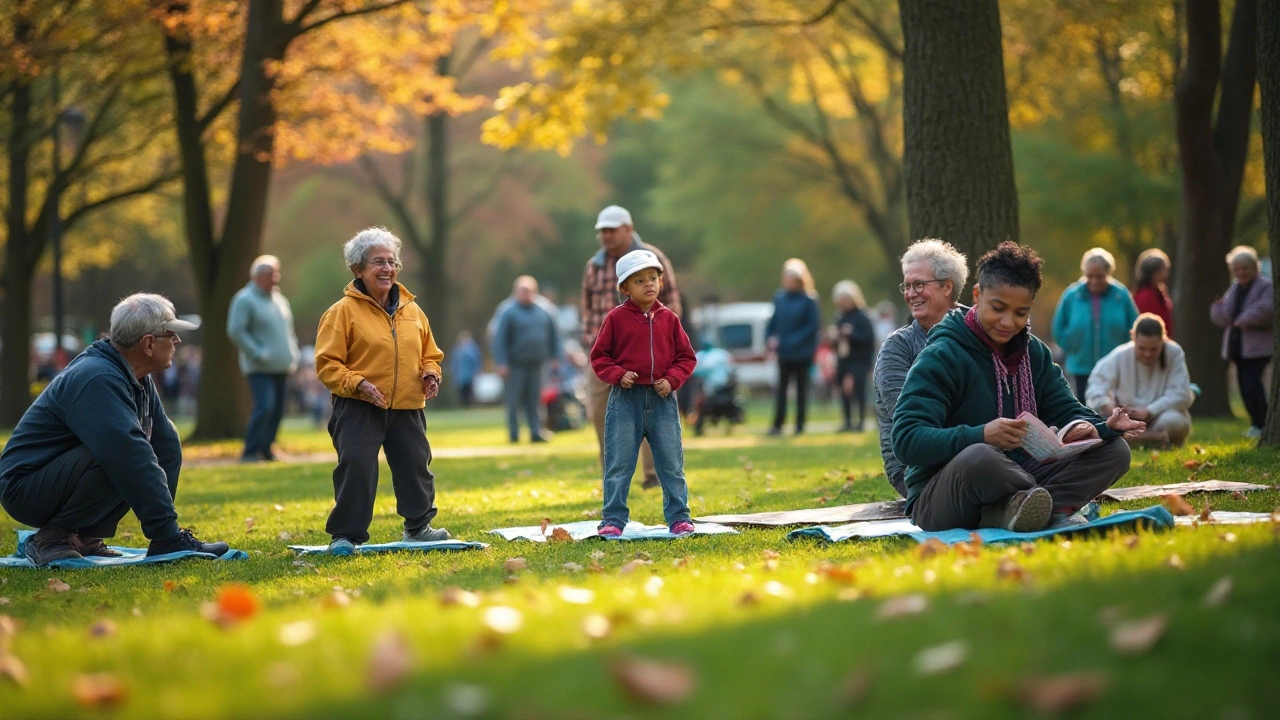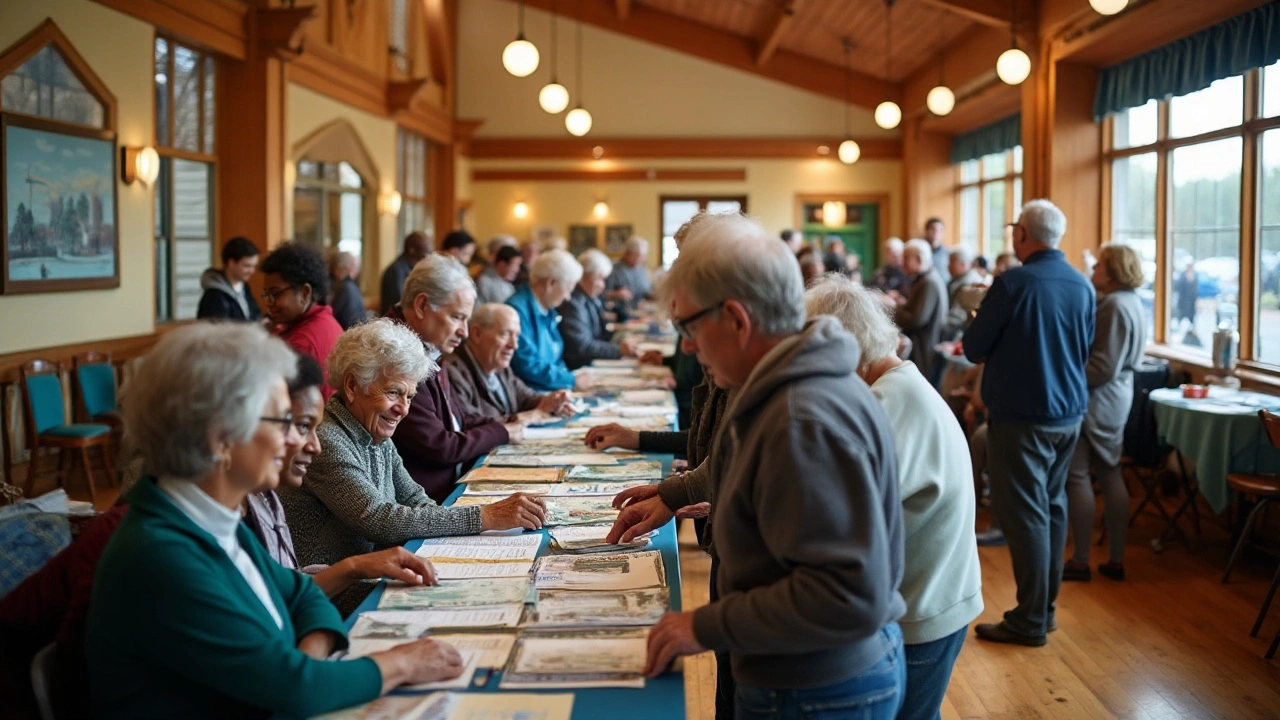Taking care of an elderly loved one in Virginia can get expensive and overwhelming, but government help is available. From Medicaid waivers and cash programs to local support groups, different resources can ease your burden. This article breaks down what kind of help you can apply for, who qualifies, and how to start the process. Discover tips to stretch your aid further and avoid the common headaches with paperwork. Many families don’t realize how much support is right at their fingertips until they ask.

- Created by: Lydia Carmichael
- Completed on: 20 Jan 2025
- Categories: Elderly Support
As we embrace the new year, Massachusetts continues to commit to providing a robust support network for its elderly residents. The journey through aging presents unique challenges and opportunities, and the state's assistance programs strive to make this transition as smooth and dignified as possible.
From medical care to social integration, these programs aim to cover every aspect of senior life. Massachusetts, with its rich history and vibrant community life, offers seniors not just care, but a continuum of support designed to foster independence and well-being.
Understanding the myriad of options available can be overwhelming. Yet, it's crucial for elderly individuals, their families, and caregivers to be informed. Whether through government initiatives or local community efforts, the resources shared here are vital in helping seniors live their golden years with grace and dignity.
- Healthcare Assistance Programs
- Financial Support Options
- Housing and Living Arrangements
- Community and Social Services
- Transportation and Mobility Services
- Caregiver Support and Resources
Healthcare Assistance Programs
Massachusetts is renowned for its comprehensive healthcare assistance programs, tailored to support the aging population. The cornerstone of these services is MassHealth, the state's Medicaid program, offering a wide range of healthcare benefits to eligible seniors. From primary care to specialized medical services, MassHealth is critical in providing necessary medical attention, especially for those facing financial constraints. Beyond medical coverage, the program also encompasses long-term care and home health services, allowing elderly individuals to receive care in the comfort of their homes.
For seniors who do not qualify for Medicaid, the Commonwealth Care program provides an alternative. This program bridges the gap for low to moderate-income individuals, ensuring that no senior is left without essential medical coverage. Perhaps one of the most significant advantages of these healthcare assistance programs is the preventive care services included, which focus on maintaining health rather than just treating illness. Regular check-ups, vaccinations, and screenings are encouraged, aiming to catch potential health issues early.
According to a recent report from the Massachusetts Executive Office of Health and Human Services, "Preventive care is an integral part of ensuring our seniors not only live longer but live healthier lives. We strive to make these services as accessible as possible."In addition to state-run programs, Massachusetts boasts a vibrant network of community health centers providing services ranging from dental care to mental health support. These centers often offer a sliding fee scale based on income, making it an accessible option for many.
Another critical facet of healthcare assistance is Medicare, a federal program widely used by seniors throughout the United States, including Massachusetts. Within Medicare, there are various plans, such as Part A and Part B, covering hospital and medical insurance, respectively. Medicare also offers Part D, which is wildly popular for its prescription drug coverage. Choosing the right Medicare plans can seem daunting, but Massachusetts provides SHINE (Serving the Health Insurance Needs of Everyone) counselors to aid seniors in navigating these complex choices, ensuring they receive the best possible care.
An often overlooked yet crucial aspect of healthcare in Massachusetts is the focus on mental health and wellness. Many programs offer integrated care plans, recognizing that mental well-being is as essential as physical health. Seniors have access to counseling, therapy, and support groups, either through their healthcare plans or community organizations. Such holistic approaches are fundamental in maintaining a balanced lifestyle and promoting the overall well-being of elderly residents.
The impact of these robust healthcare assistance programs is evident in the statistics. Surveys indicate that Massachusetts consistently ranks high for senior health care satisfaction and quality. A vital aspect of this is the state’s commitment to equity in access, ensuring all seniors—regardless of income, race, or location—have the healthcare they need. This dedication is reflected in the state’s diverse approaches to service provision, always striving to meet the needs of its elderly population.
Financial Support Options
For many elderly residents in Massachusetts, managing finances as they age can be challenging, especially with fixed incomes and rising medical costs. Fortunately, there are various financial support options available to help ease these concerns. The Senior Circuit Breaker Tax Credit, for example, provides financial relief on real estate taxes for income-eligible seniors. It is a state income tax credit for property owners and renters over the age of 65 whose property taxes exceed 10% of their income. This initiative helps alleviate the financial burden for many, allowing them to stay in their homes longer and maintain their independence.
Massachusetts Elderly Care Fund offers another layer of assistance by supporting low-income seniors who need help with medical expenses or housing costs. This program aims to bridge the gap for those who might not qualify for other forms of financial support but still face significant expenses. By providing grants and subsidies, the fund enables seniors to afford necessary healthcare and living essentials. A portion of these funds also supports community-based programs, providing resources directly to local organizations that assist elderly citizens.
Social Security remains a critical lifeline for many older adults in the state. Understanding how to maximize benefits is essential. Consulting with a financial advisor or using the services from the Social Security Administration, seniors can learn strategies to increase their monthly benefit amounts. It's often misunderstood when to begin collecting benefits — whether to start as early as 62 or to delay until 70 to receive a larger monthly amount. Each approach has its own benefits depending on an individual's financial situation and life expectancy.
The Massachusetts Department of Transitional Assistance offers another helpful program: the Supplemental Nutrition Assistance Program (SNAP). This program ensures that seniors have access to adequate nutrition, which is crucial for maintaining health and well-being. By reducing grocery costs, SNAP allows seniors to allocate more of their budget towards other living expenses, preventing food insecurity among the elderly population. The benefits and application process may seem complex, but local offices provide guidance and support for applicants, ensuring they receive the help they need promptly.
"Financial stability is the cornerstone of healthy aging. With the right resources and guidance, seniors can navigate their finances with confidence and security," says Dr. Patricia Greene, a leading expert in geriatric economics.
For those who are eligible, MassHealth can be a crucial aid as well. This state program offers health insurance coverage for low- to middle-income individuals or those with specific medical conditions. It complements Medicare, addressing coverage gaps and potentially saving significant out-of-pocket costs that can strain a senior's finances. By covering a range of medical services, MassHealth ensures seniors receive comprehensive care, which might include long-term services and support, without the overwhelming financial pressure.
Additionally, it's worth exploring the array of local organizations and charities that offer financial counseling tailored to seniors. These services often include budgeting assistance, debt management strategies, and steps to prevent financial exploitation. Awareness and education in financial literacy can empower the elderly, giving them the tools to make informed decisions about their money and secure their futures. It's important for seniors and their families to be aware of these resources and to act early, ensuring a financially stable and worry-free retirement.

Housing and Living Arrangements
Massachusetts offers a diverse array of housing and living arrangements tailored to meet the varied needs of its elderly population. From independent living to more supportive environments, seniors can find suitable accommodations that align with their lifestyles, health requirements, and personal preferences. Independent living communities provide a perfect blend of freedom and support, allowing seniors to thrive in a community setting while maintaining their autonomy. These communities often foster a social atmosphere where residents can engage in activities and form meaningful connections with neighbors.
Assisted living facilities are another popular choice for those who might require more help with daily activities. These facilities offer a residential environment, often with apartments or private rooms, where trained staff provide personal care services, such as bathing, dressing, and medication management. Beyond these personal needs, assisted living facilities in Massachusetts place a strong emphasis on creating vibrant environments with diverse programming that encourages social engagement and mental stimulation. Specialized care, such as memory care facilities for those with Alzheimer's or dementia, is also available, ensuring that individuals receive tailored support.
For those who wish to age in place, Massachusetts implements programs like the Home Care Aid Program, which provides financial assistance for home modifications, making it easier and safer for seniors to remain in their homes. This program can include installing grab bars, widening doorways, and setting up medical alert systems, ultimately promoting independence and safety. Many towns also offer senior housing options, providing subsidized apartments that consider the financial constraints faced by seniors on a fixed income.
The state also recognizes the importance of family caregivers in supporting elderly loved ones and provides resources like the Family Caregiver Support Program. This initiative helps families navigate the complexities of caregiving by providing access to respite care and other support services, enabling caregivers to sustain their own well-being while providing critical, ongoing care. The interplay between family support and community resources creates a holistic approach that benefits both seniors and their families.
"The goal is to create a seamless network of supports that respect the dignity and choices of our elderly," says James Coughlin, a leading advocate for elderly rights in Massachusetts. "By focusing on diversity in living arrangements, we can ensure that seniors have quality options that meet both their immediate needs and long-term aspirations."
Massachusetts also promotes co-housing initiatives that pool resources and bring seniors together in shared living spaces, fostering community life and reducing the feeling of isolation. In these setups, residents share communal spaces like gardens and kitchens, participating in shared responsibilities that bolster collaboration and friendship. Such models emphasize intergenerational living and highlight how creative housing solutions are emerging as viable alternatives for today's seniors.
To cater to this vast spectrum of elderly care options, Massachusetts continually invests in research and improvements, keeping up with the evolving needs of its aging population. As part of its commitment, the state recruits housing advocates who guide seniors through available options, ensuring they make informed decisions about their living arrangements.
Community and Social Services
In Massachusetts, community and social services for the elderly are crucial for creating a supportive environment that promotes engagement and participation. These services are designed to help seniors maintain an active, connected lifestyle, which is essential for their mental and emotional well-being. One well-known program is the Massachusetts Council on Aging, which works diligently to organize events and provide resources tailored to the needs of older adults. Whether it’s cultural workshops, fitness classes, or volunteer opportunities, there’s a wealth of activities that cater to various interests, ensuring that the elderly have plenty of opportunities to socialize and remain active in their communities.
Public libraries also play a significant role. Across the state, libraries offer a plethora of activities that aim to bring seniors together. Book clubs, educational lectures, and crafting circles are just a few examples of the programs available. These events provide not only a chance to learn something new but also an opportunity to forge friendships and combat loneliness—a significant issue among seniors. Keeping the mind active is as important as physical well-being, and Massachusetts recognizes this in its emphasis on lifelong learning and skills development for the elderly.
Local community centers, too, are indispensable in this aspect. Many centers offer subsidized or even free courses that range from technology classes designed to familiarize seniors with digital tools to yoga sessions specifically tailored for older bodies. This diversity ensures that seniors can find something that not only interests them but is also suitable for their physical abilities. These centers often act as vital lifelines in coordinating transportation services, making it easier for seniors to attend events and appointments.
"Staying socially active is just as important as physical activity for seniors," says Delia Franklin, director of the Elder Affairs Office. "It’s about keeping their spirits up and providing them with the joy of companionship."
Moreover, partnerships between non-profit organizations and local governments have been instrumental in expanding the reach of these services. Programs offering meal delivery, like Meals on Wheels, not only meet nutritional needs but also provide regular social interaction via home visits. For those who are more mobile, congregate meal programs at senior centers offer a dual benefit of nourishment and fellowship.
A noteworthy feature is the growing trend of intergenerational programs, which bring different age groups together. Schools and youth organizations often collaborate with senior centers to create shared activities. These exchanges not only enrich the cultural literacy of younger generations but also rejuvenate the elderly by involving them in lively discussions and shared projects. In Massachusetts, these programs have shown tremendous success in reducing stereotypes and building stronger, more inclusive communities.
Taking into account the varied needs of its senior population, Massachusetts provides a broad support structure that caters to elderly care needs through its community programs. The focus is on creating a holistic environment where seniors can thrive socially and emotionally. As the demand for these services grows, the state continues to innovate and expand its offerings, reaffirming its commitment to enhancing the quality of life for its elderly citizens.

Transportation and Mobility Services
For the elderly in Massachusetts, maintaining the freedom to move about independently is not just a luxury; it's a vital component of staying engaged with the community and accessing necessary services. The state offers a suite of transportation and mobility services specifically designed to meet the needs of its senior residents. Public transportation systems are adapting to accommodate the rising number of older adults, ensuring accessibility and safety. The Massachusetts Bay Transportation Authority (MBTA), for instance, has prioritized making its services senior-friendly by providing reduced fares and user-friendly access points. Seniors can take advantage of the MBTA’s Senior Charlie Card, which offers significant discounts. This initiative has been praised not just for its economic benefits but also for the psychological boost it gives to elders, allowing them to reintegrate socially without financial worries.
Private and non-profit organizations also play a significant role in enhancing mobility options. Programs like The RIDE and ITNGreaterBoston offer door-to-door services with a personal touch that public transport can't always provide. These services recognize that mobility issues extend beyond just getting from point A to B; they understand the nuances of each individual's journey, aiming to provide a seamless experience that respects both time and dignity. A rider can schedule trips days in advance, ensuring that they remain active participants in their communities. This comprehensive understanding of elderly transportation needs ensures that appointments, social visits, and shopping trips are not hampered by a lack of options.
Massachusetts has also embraced technology to revolutionize elderly mobility through innovative solutions. Ride-sharing apps optimized for seniors have begun to gain traction. These platforms often include features that cater to varying levels of tech-savvy users, ensuring ease of use without the intimidation that can come from modern technology. With just a few clicks, seniors can summon a ride, providing an empowering blend of independence and security. A quote from the Executive Office of Elder Affairs highlights the importance of these services:
"Our commitment is to remove barriers to mobility, ensuring every senior has the support they need to live life on their terms."It's evident that these transportation solutions do more than just bridge distances; they build connections, enhance accessibility, and empower seniors to lead fulfilling lives.
The importance of such systems is underscored when considering the statistics; the number of seniors in Massachusetts is projected to rise significantly in the coming years. As such, addressing the mobility needs of this demographic is not just a social responsibility but an economic necessity. Experts predict a substantial boost in local economies due to facilitated senior access to retail and service sectors. In light of this, public officials and private entities continue to explore partnerships to expand and enhance mobility services. The goal is to ensure these offerings keep pace with both technological advances and increasing demand.
In conclusion, Massachusetts has positioned itself at the forefront of elderly care by offering multifaceted transportation solutions that not only reflect an understanding of senior needs but also a commitment to enriching their quality of life. Whether through public initiatives or private partnerships, the focus remains steadfast on providing the elderly with the mobility they deserve, thus ensuring their continued engagement with society. These efforts collectively underscore a community-centric approach, fostering environments wherein elders can thrive.
Caregiver Support and Resources
Caring for an elderly loved one can be a rewarding yet demanding task, requiring emotional resilience, physical energy, and an understanding of various medical and psychological needs. In Massachusetts, the importance of supporting those who dedicate themselves to caring for the elderly is reflected in the breadth of support programs available. These initiatives are designed not only to alleviate the pressures faced by caregivers but also to empower them with the resources they need to ensure quality elderly care.
The Massachusetts Family Caregiver Support Program (MFCSP) serves as a cornerstone of the state's efforts. This program provides a wide range of services including counseling, support groups, and caregiving training. Through these services, caregivers can access advice from professionals on managing stress, communicating effectively with healthcare providers, and understanding the complexities of aging-related diseases. It's not just about the practical aspects; MFCSP also emphasizes the well-being of caregivers themselves, offering respite care to give them much-needed breaks.
Another invaluable resource is the National Family Caregiver Support Program (NFCSP). This federal initiative extends its reach within Massachusetts, offering diverse support tailored to multi-generational caregiving. Did you know that nearly a third of caregivers are actually supporting elders while managing their own careers and family life? According to the Family Caregiver Alliance, this multi-tasking nature of caregiving places unique strains on the caregivers' health.
"Caregivers are the unsung heroes of our society, bearing their own burdens while lifting the weight of others," stated Grace Whiting, a prominent advocate for caregiving policies.
Certainly, navigating these programs can be complex, and that's where local Area Agencies on Aging (AAA) come into play. These agencies serve as a regional hub for information and resources, providing personalized assistance in connecting caregivers with the appropriate services. Massachusetts is fortunate to have a robust network of these agencies, each dedicated to demystifying the caregiving landscape.
Support groups form another crucial element of caregiver resources. These gatherings, often organized by local community centers or health organizations, offer an arena for sharing experiences and coping mechanisms. Having a consistent support network can significantly reduce stress levels, prevent burnout, and promote a strong sense of community. With options ranging from in-person meet-ups to online forums, these groups cater to diverse preferences and schedules.
Additionally, educational workshops and online resources abound, aimed at equipping caregivers with knowledge on how to improve their caregiving skills effectively. Topics might include understanding dementia, managing medications, and using technology to monitor health indicators. The availability of these resources marks a crucial aspect of the comprehensive approach Massachusetts takes in facilitating elderly support.
Lastly, financial support cannot be overlooked. Many caregivers incur out-of-pocket expenses, impacting their personal finances. Programs like MassHealth's Frail Elder Waiver help ease this burden by covering a variety of long-term care services for eligible elders, thus indirectly supporting caregivers.
Ultimately, in Massachusetts, the wide array of caregiver support programs reflects a societal respect and acknowledgement of the vital role these individuals play. By utilizing these resources, caregivers can not only enhance their ability to provide care but also nurture their personal health and emotional balance, ensuring a sustainable caregiving journey.
Caring for aging parents can be both rewarding and challenging, and it often comes with financial strain. Various programs offer financial assistance to alleviate this burden, recognizing the vital role family caregivers play. This article explores the options available, including state-funded programs and other resources to help you balance love and responsibility without overwhelming expenses.
Navigating the plethora of elderly assistance programs in Massachusetts can be daunting, but understanding the options can significantly impact the quality of life for seniors and their caregivers. This article explores various state-sponsored and private programs available in 2025, offering support in healthcare, housing, financial assistance, and community services. By diving into each program's specifics, readers can find the most suitable resources for their needs. Discover how these programs empower the elderly to lead independent and fulfilling lives.

